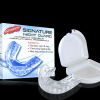About Bruxism
Teeth grinding and jaw clenching is a common condition that affects around 15% of people. It often occurs during sleep and most people are not even aware they do it.
The condition can be related to stress and anxiety, but often the cause is unclear. Without treatment, the symptoms can range from mild jaw pain and headaches to major dental damage requiring expensive dental treatment.
The sound made by grinding can be loud enough to disturb a partner’s sleep. And this is often how people first find out they have the condition.
Signs and symptoms of bruxism may include:
- Teeth grinding or clenching, which may be loud enough to wake up your sleep partner
- Damaged teeth that are flattened or fractured
- Worn tooth enamel, exposing deeper layers of your tooth
- Increased tooth pain or sensitivity
- Tired or tight jaw muscles
- Pain that feels like an earache
- Dull headache starting in the temples
- Damage from chewing on the inside of your cheek
- Poor sleep quality
Treatment
Most cases are mild enough to resolve on their own over time without professional intervention. In this case it’s important to use a Night Guard to protect the teeth from damage. Many people find wearing a Night Guard helps resolve their bruxism. And many get the added benefit of it reducing their snoring and improving sleep.
In severe cases that don’t respond to home treatments, a dental professional many suggest another approach. Stress management and behavioural changes can often help. some cases may even require medications to treat related sleep disorders or other medical conditions.
Lifestyle and home remedies
Self-care steps may prevent or help treat bruxism:
- Reduce stress. Listening to music, taking a warm bath or exercising can help you relax and may reduce your risk of developing bruxism.
- Avoid stimulating substances in the evening. Don’t drink caffeinated coffee or caffeinated tea after dinner and avoid alcohol during the evening, as they may worsen bruxism.
- Practice good sleep habits. Getting a good night’s sleep, which may include treatment for sleep problems, may help reduce bruxism.
- Talk to your sleep partner. If you have a sleeping partner, ask him or her to be aware of any grinding or clicking sounds that you might make while sleeping so you can report this to your dentist or doctor.
- Schedule regular dental exams. Dental exams are the best way to identify bruxism. Your dentist can spot signs of bruxism in your mouth and jaw during regular visits and exams.


